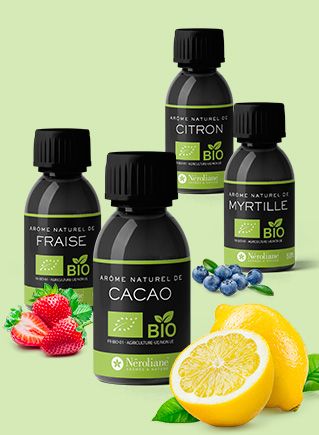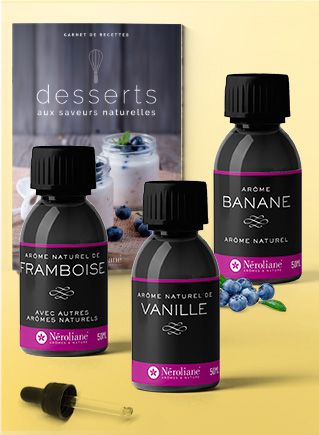Discover the latest natural organic flavors!
I discoverWarnings
Being completely natural, essential oils are plant extracts, generally derived by distillation of aromatic substances, flowers, leaves, bark, or roots, or by pressing, as with citrus zests, from which the “juice” is extracted. They are used in the manufacture of perfumes but are equally involved in pharmaceutical, industrial, and domestic (home, garden, insects, etc.) applications. Known for their numerous benefits, they bring well being to everyday life.
When employed in phytotherapy or aromatherapy, they work on illnesses. They possess antiseptic, antiviral, antitoxic, and antineuralgic properties; they have healing power and above all energetic engagement.
Alimentary usage allows, for example, replacement in the off season of fresh herbs while simultaneously bringing medicinal values to recipes: basil and peppermint facilitate digestion, thyme and rosemary fight colds, vanilla or mandarin help to regenerate the complexion.
A simple fruit salad takes on added dimension with lemon or grapefruit essential oil; a simple dish of mashed potatoes gains a spring-like quality with a few drops of thyme or rosemary.
To dig deeper into the subject, refer to several works by Dr. Jean Valnet.
Here are some warnings drawn from a work by Jennie Harding, “Belle Santé.”
Dosage:
Essential oils being plant concentrates, they are extremely potent. They must be handled with care, using a pipette or dropper. Never exceed the doses indicated; natural essences used thoughtlessly can compromise your health.
Internal usage:
Do not eat pure essential oils; they can irritate the digestive passageways and in high doses cause internal damage.
To ingest an essential oil: 2 to 5 drops of it can be added to a teaspoon of honey, into a sugar cube, or into a glass of tepid water.
In the kitchen it is important to dilute essential oils and to incorporate them into the whole of a culinary preparation: sauces, marinades, drinks, meals, cakes.
External usage:
Generally speaking, it is recommended that you do not use essential oils directly on the skin and that you dilute them in vegetable oil (such as sweet almond).
Nonetheless, some essential oils whose track record is well established can be applied directly to the skin to take better advantage of their active principles.
We invite you, therefore, to consult an aromatherapist or some of the serious specialized works on the subject before any use in order to verify whether or not the essential oil in question should be used in a pure or a diluted state.
Pathologies:
In cases of significant malaise or illness, consult first with a health professional before using any essential oil.
Eyes:
Any contact with the eyes is prohibited. In case of accident, do not rinse the eye with water but with a fatty substance or a neutral vegetable oil (sweet almond oil, cooking oil, etc.)
Pregnancy and breast feeding
Caution: certain essential oils can have an abortive effect or can impede milk production. It is therefore recommended that essential oils not be used during pregnancy absent medical advice from an authorised specialist.
Sensitive skin:
If you have sensitive skin you should make a patch test before using an essential oil. In case of redness, wash with a gentle soap and apply some sweet almond oil to the spot to calm the skin.
All the citrus oils – bergamot, lemon, orange, and mandarin – are potentially photosensitizing. They can cause irregular pigmentation after exposure to ultraviolet rays. Avoid UV radiation and sunbathing for 12 hours after using citrus essential oils.
Keep away from children:
Keep essential oils out of the hands of children. Bearing in mind the extreme sensitivity of children up to 12 years of age, it is recommended that essential oils not be used with them without the medical advice of an authorised specialist.
Preserving your oils:
The three principal enemies of essential oils are: light, air (oxygen), and variations in temperature. It is thus recommended that they be stored in a cool environment away from the light and in a well-sealed container. Oxidation of essential oils elevates the risk of skin irritation; pay attention to the expiration date imprinted on the bottle.








